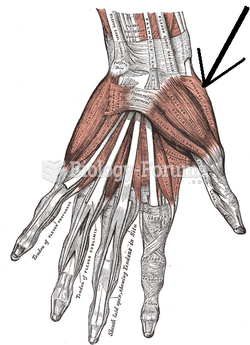|
|
|
Bacteria have flourished on the earth for over three billion years. They were the first life forms on the planet.
Stevens-Johnson syndrome and Toxic Epidermal Necrolysis syndrome are life-threatening reactions that can result in death. Complications include permanent blindness, dry-eye syndrome, lung damage, photophobia, asthma, chronic obstructive pulmonary disease, permanent loss of nail beds, scarring of mucous membranes, arthritis, and chronic fatigue syndrome. Many patients' pores scar shut, causing them to retain heat.
Of the estimated 2 million heroin users in the United States, 600,000–800,000 are considered hardcore addicts. Heroin addiction is considered to be one of the hardest addictions to recover from.
About 100 new prescription or over-the-counter drugs come into the U.S. market every year.
The Romans did not use numerals to indicate fractions but instead used words to indicate parts of a whole.







